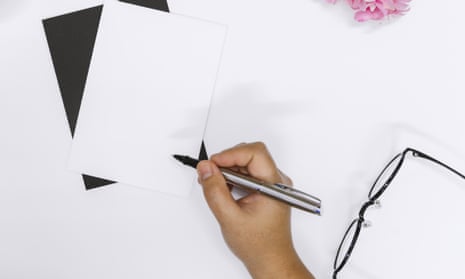The act of writing – physically writing, pen in hand, overpriced notepad on desk – is a uniquely visceral experience. I have discovered this over the past few months, through the letters I’ve written to my grandma. It is a style of communication that takes time, dedication and patience with both yourself and your recipient.
Letter writing is in every way antithetical to our modern ideas of communication: instant, plentiful and filled with shorthand and images sliding us towards the illusion of face to face contact. We are encouraged to pour every thought, idea or moment into messaging apps – a stream-of-consciousness dump that we allow ourselves to forget once the conversational tide turns. All for a ping of satisfaction. But that feeling pales in comparison to the jolts of cold concrete under barefoot as you approach your mailbox, the excitement of physically holding a letter that isn’t junk or a bill – your name written in ink with care and purpose.
The whole process is an oxymoronic practice in both intimacy and formality. But it is this unique position that has allowed my grandmother and I to become closer. Though we were never estranged, there were 93 years of life she didn’t readily share over milky tea and Arnott’s biscuits.
I knew the basics, a few stories of her time growing up on a sheep farm in Harden, her married life in Gulgong, widowed in Sydney. Having been a child of a strictly urban upbringing and raised very much in my father’s Cypriot culture, it seemed on the surface our lives were naturally divergent. Yet the paper-thin barrier seems to have given us the space to open up with unparalleled casualty and familiarity.
I’ve been graced with custard recipes, romanticised minutia of her day, and a brief dramatic moment where toilet paper was used to bemoan a lined-paper shortage; her thoughts, feelings and flair – all leading to her sending a 20-page handwritten memoir, detailing every key event in her life with the request that I create a digital version. It’s a gift outlining things my own mother – her daughter – didn’t know. I have nothing of equivalent value to send back, my life has been too short, too mediated by technology to make a good story. I can’t just write out a series of funny tweets with the heading “mood”.
The act of writing a letter changes the way one communicates completely. Suddenly you’re interrogating every thought and event, considering whether it is worth writing down (the difficulty of this process directly correlates to how nice your stationery is). To spill everything out as normal doesn’t seem worth the time, their time. I’m suddenly forced to think about the “right” words – slang looks weird and loses its meaning. I am forced to fill pages myself without relying on the immediacy of banter. My posture is straight for once in my life.
Often written over hours or days, dedicated time is set aside and woven throughout the letters themselves – signposting the breaks, the starts, the need to dip away because her dessert is had at strictly 7pm. I sit with Grandma’s words – deciphering her careful handwriting as she does my scribble – taking in each word and its meaning as I reverse engineer which question I had asked her, as I’ve completely forgotten. I am only focused on this conversation.
So often tech giants are preoccupied with finding the next “thing” that will connect us, blinding our senses to the quality and benefits of bygone forms. I know my grandmother better now than in 24 years of sporadic phone calls and ritualistic visits. And now I have her words filed away forever.

Comments (…)
Sign in or create your Guardian account to join the discussion